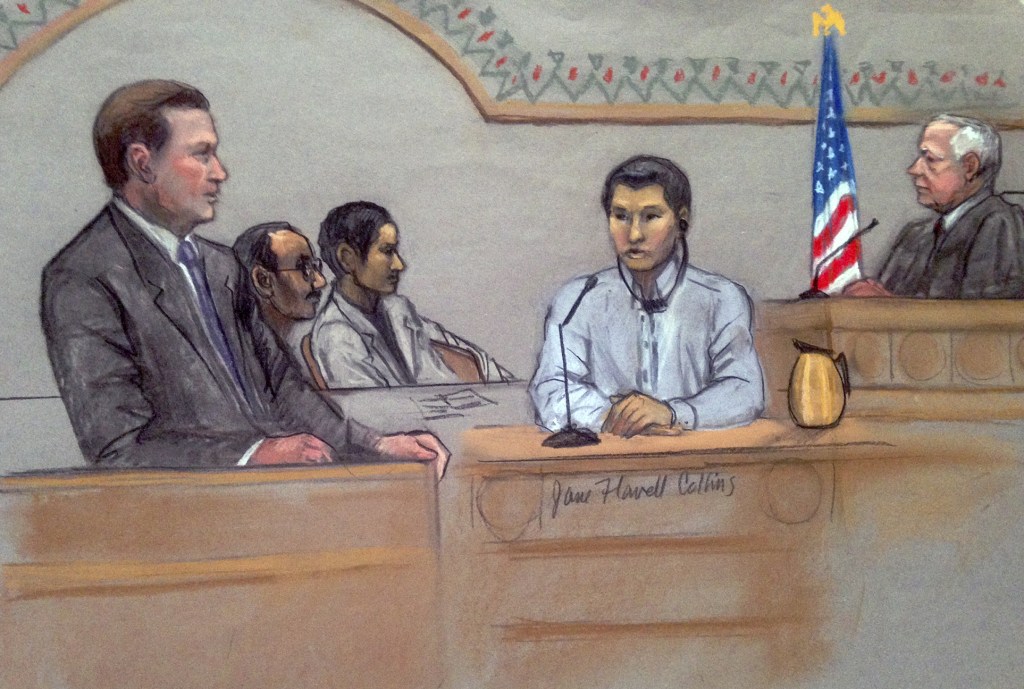BOSTON — A friend of Dzhokhar Tsarnaev acknowledged Tuesday he suspected his friend was involved in the Boston Marathon bombings when he removed items from Tsarnaev’s dorm room several days after the deadly attack.
Dias Kadyrbayev’s testimony came during a federal court hearing on his request to suppress statements he made to authorities while being questioned about Tsarnaev.
Kadrybayev conceded during cross-examination that he told agents he suspected Tsarnaev was being sought in the bombings when he and another of Tsarnaev’s friends, Azamat Tazhayakov, went to Tsarnaev’s room at the University of Massachusetts-Dartmouth. The two men are accused of trying to obstruct the investigation into the bombings by throwing away Tsarnaev’s backpack containing fireworks.
“You said you didn’t know for sure that he was the bomber, that you suspected he was the bomber, correct?” asked Assistant U.S. Attorney Stephanie Siegmann.
“Yes, that’s correct,” Kadyrbayev replied.
Kadyrbayev testified Monday that he felt intimidated and pressured by agents who questioned him the day after the FBI released photos of Tsarnaev and his older brother, Tamerlan, as suspects in the bombings. Two pressure cooker bombs placed near the finish line of the April 15, 2013, marathon killed three people and injured more than 260.
Tamerlan Tsarnaev was killed during a shootout with police on April 19. Dzhokhar Tsarnaev has pleaded not guilty and is awaiting a trial in November. He faces the possibility of the death penalty.
Kadyrbayev’s lawyer argues that Kadyrbayev — a native of Kazakhstan — was not proficient enough in English to fully understand the forms he signed giving authorities permission to question him without a lawyer.
Kadyrbayev said that after one of the agents showed him a summary of his statements, he objected when he saw the agent had written that Kadyrbayev said he “knew” Tsarnaev was the bombing suspect when he removed items from his dorm room. He said he asked the agent to change the word “knew” to “suspected.”
Siegmann attempted to demonstrate that Kadyrbayev fully understood the forms he signed. She showed him transcripts of two recorded jailhouse phone conversations he had with his girlfriend. In one, when he is talking about a form he signed giving consent for agents to search his apartment, Kadrybayev said, “Everything that we did — everything that I did, everything that I signed, I signed it on my own,” according to the transcript.
U.S. District Judge Douglas Woodlock did not rule on Kadyrbayev’s motion to suppress. He said he would allow prosecutors and Kadyrbayev’s lawyer to submit written briefs and make oral arguments during a hearing in August.
Woodlock denied a request from Kadyrbayev’s lawyer to elicit testimony from a state trooper and an attorney who claimed to represent Kadyrbayev while he was being questioned.
Prosecutors said last month that a lawyer called the state police barracks where Kadyrbayev was being questioned. The lawyer said he had been contacted by the state’s public defender agency and told to call the barracks.
Woodlock denied the request, saying the issue was not relevant to Kadyrbayev’s motion to suppress.
Send questions/comments to the editors.



Success. Please wait for the page to reload. If the page does not reload within 5 seconds, please refresh the page.
Enter your email and password to access comments.
Hi, to comment on stories you must . This profile is in addition to your subscription and website login.
Already have a commenting profile? .
Invalid username/password.
Please check your email to confirm and complete your registration.
Only subscribers are eligible to post comments. Please subscribe or login first for digital access. Here’s why.
Use the form below to reset your password. When you've submitted your account email, we will send an email with a reset code.